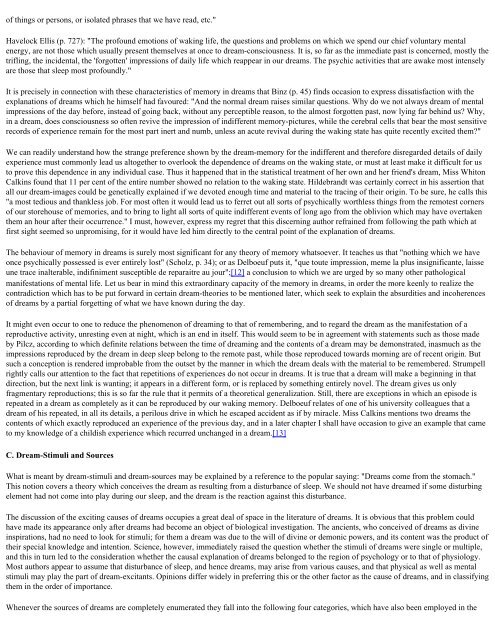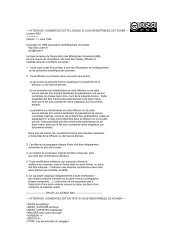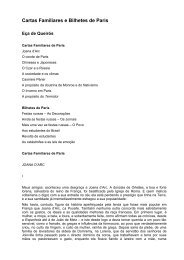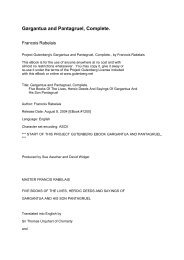The Interpretation of Dreams Sigmund Freud (1900)
The Interpretation of Dreams Sigmund Freud (1900)
The Interpretation of Dreams Sigmund Freud (1900)
Create successful ePaper yourself
Turn your PDF publications into a flip-book with our unique Google optimized e-Paper software.
<strong>of</strong> things or persons, or isolated phrases that we have read, etc."<br />
Havelock Ellis (p. 727): "<strong>The</strong> pr<strong>of</strong>ound emotions <strong>of</strong> waking life, the questions and problems on which we spend our chief voluntary mental<br />
energy, are not those which usually present themselves at once to dream-consciousness. It is, so far as the immediate past is concerned, mostly the<br />
trifling, the incidental, the 'forgotten' impressions <strong>of</strong> daily life which reappear in our dreams. <strong>The</strong> psychic activities that are awake most intensely<br />
are those that sleep most pr<strong>of</strong>oundly."<br />
It is precisely in connection with these characteristics <strong>of</strong> memory in dreams that Binz (p. 45) finds occasion to express dissatisfaction with the<br />
explanations <strong>of</strong> dreams which he himself had favoured: "And the normal dream raises similar questions. Why do we not always dream <strong>of</strong> mental<br />
impressions <strong>of</strong> the day before, instead <strong>of</strong> going back, without any perceptible reason, to the almost forgotten past, now lying far behind us? Why,<br />
in a dream, does consciousness so <strong>of</strong>ten revive the impression <strong>of</strong> indifferent memory-pictures, while the cerebral cells that bear the most sensitive<br />
records <strong>of</strong> experience remain for the most part inert and numb, unless an acute revival during the waking state has quite recently excited them?"<br />
We can readily understand how the strange preference shown by the dream-memory for the indifferent and therefore disregarded details <strong>of</strong> daily<br />
experience must commonly lead us altogether to overlook the dependence <strong>of</strong> dreams on the waking state, or must at least make it difficult for us<br />
to prove this dependence in any individual case. Thus it happened that in the statistical treatment <strong>of</strong> her own and her friend's dream, Miss Whiton<br />
Calkins found that 11 per cent <strong>of</strong> the entire number showed no relation to the waking state. Hildebrandt was certainly correct in his assertion that<br />
all our dream-images could be genetically explained if we devoted enough time and material to the tracing <strong>of</strong> their origin. To be sure, he calls this<br />
"a most tedious and thankless job. For most <strong>of</strong>ten it would lead us to ferret out all sorts <strong>of</strong> psychically worthless things from the remotest corners<br />
<strong>of</strong> our storehouse <strong>of</strong> memories, and to bring to light all sorts <strong>of</strong> quite indifferent events <strong>of</strong> long ago from the oblivion which may have overtaken<br />
them an hour after their occurrence." I must, however, express my regret that this discerning author refrained from following the path which at<br />
first sight seemed so unpromising, for it would have led him directly to the central point <strong>of</strong> the explanation <strong>of</strong> dreams.<br />
<strong>The</strong> behaviour <strong>of</strong> memory in dreams is surely most significant for any theory <strong>of</strong> memory whatsoever. It teaches us that "nothing which we have<br />
once psychically possessed is ever entirely lost" (Scholz, p. 34); or as Delboeuf puts it, "que toute impression, meme la plus insignificante, laisse<br />
une trace inalterable, indifiniment susceptible de reparaitre au jour";[12] a conclusion to which we are urged by so many other pathological<br />
manifestations <strong>of</strong> mental life. Let us bear in mind this extraordinary capacity <strong>of</strong> the memory in dreams, in order the more keenly to realize the<br />
contradiction which has to be put forward in certain dream-theories to be mentioned later, which seek to explain the absurdities and incoherences<br />
<strong>of</strong> dreams by a partial forgetting <strong>of</strong> what we have known during the day.<br />
It might even occur to one to reduce the phenomenon <strong>of</strong> dreaming to that <strong>of</strong> remembering, and to regard the dream as the manifestation <strong>of</strong> a<br />
reproductive activity, unresting even at night, which is an end in itself. This would seem to be in agreement with statements such as those made<br />
by Pilcz, according to which definite relations between the time <strong>of</strong> dreaming and the contents <strong>of</strong> a dream may be demonstrated, inasmuch as the<br />
impressions reproduced by the dream in deep sleep belong to the remote past, while those reproduced towards morning are <strong>of</strong> recent origin. But<br />
such a conception is rendered improbable from the outset by the manner in which the dream deals with the material to be remembered. Strumpell<br />
rightly calls our attention to the fact that repetitions <strong>of</strong> experiences do not occur in dreams. It is true that a dream will make a beginning in that<br />
direction, but the next link is wanting; it appears in a different form, or is replaced by something entirely novel. <strong>The</strong> dream gives us only<br />
fragmentary reproductions; this is so far the rule that it permits <strong>of</strong> a theoretical generalization. Still, there are exceptions in which an episode is<br />
repeated in a dream as completely as it can be reproduced by our waking memory. Delboeuf relates <strong>of</strong> one <strong>of</strong> his university colleagues that a<br />
dream <strong>of</strong> his repeated, in all its details, a perilous drive in which he escaped accident as if by miracle. Miss Calkins mentions two dreams the<br />
contents <strong>of</strong> which exactly reproduced an experience <strong>of</strong> the previous day, and in a later chapter I shall have occasion to give an example that came<br />
to my knowledge <strong>of</strong> a childish experience which recurred unchanged in a dream.[13]<br />
C. Dream-Stimuli and Sources<br />
What is meant by dream-stimuli and dream-sources may be explained by a reference to the popular saying: "<strong>Dreams</strong> come from the stomach."<br />
This notion covers a theory which conceives the dream as resulting from a disturbance <strong>of</strong> sleep. We should not have dreamed if some disturbing<br />
element had not come into play during our sleep, and the dream is the reaction against this disturbance.<br />
<strong>The</strong> discussion <strong>of</strong> the exciting causes <strong>of</strong> dreams occupies a great deal <strong>of</strong> space in the literature <strong>of</strong> dreams. It is obvious that this problem could<br />
have made its appearance only after dreams had become an object <strong>of</strong> biological investigation. <strong>The</strong> ancients, who conceived <strong>of</strong> dreams as divine<br />
inspirations, had no need to look for stimuli; for them a dream was due to the will <strong>of</strong> divine or demonic powers, and its content was the product <strong>of</strong><br />
their special knowledge and intention. Science, however, immediately raised the question whether the stimuli <strong>of</strong> dreams were single or multiple,<br />
and this in turn led to the consideration whether the causal explanation <strong>of</strong> dreams belonged to the region <strong>of</strong> psychology or to that <strong>of</strong> physiology.<br />
Most authors appear to assume that disturbance <strong>of</strong> sleep, and hence dreams, may arise from various causes, and that physical as well as mental<br />
stimuli may play the part <strong>of</strong> dream-excitants. Opinions differ widely in preferring this or the other factor as the cause <strong>of</strong> dreams, and in classifying<br />
them in the order <strong>of</strong> importance.<br />
Whenever the sources <strong>of</strong> dreams are completely enumerated they fall into the following four categories, which have also been employed in the









